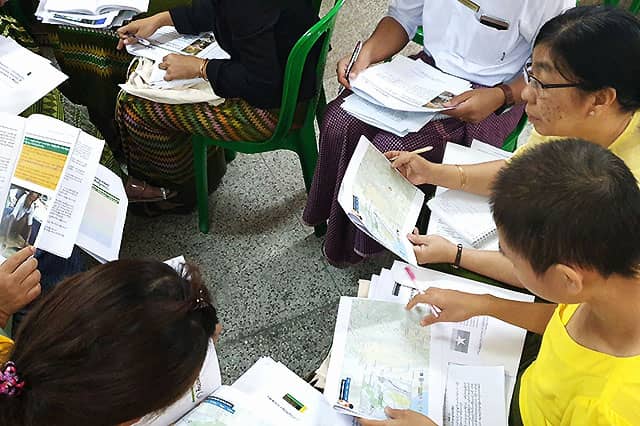Investing in Biodiversity

On 5 March, the Directorate of Investment and Company Administration (DICA)’s Yangon office hosted MCRB for a half day training workshop on biodiversity and investment to 70 DICA and Environmental Conservation Department (ECD) staff. The workshop focussed on DICA’s role in screening investment proposals to meet the requirement to promote responsible investment, and how to align this with screening for the Environmental Impact Assessment (EIA) Procedure.
The training built on MCRB’s recently published set of briefing papers on Biodiversity, Human Rights and Business (now available in both English and Myanmar) intended to help business, civil society and government understand how some types of investment in Myanmar can negatively impact biodiversity and thus affect human rights.
In his welcoming remarks Deputy Director General Dr. Marlar Myo Nyunt and Director Dr. Min Zaw Oo stressed the importance of biodiversity and eco-system services not just for Myanmar and its people, but also for ensuring sustainable and responsible investment in the country.
Director of MCRB Ms. Vicky Bowman conducted training on Biodiversity, Human Rights and Business in Myanmar explaining how impacts on biodiversity can be minimised and/or mitigated by project proponents. Vicky then provided examples of how projects in different sectors can impact biodiversity and what companies are required to do by law. Vicky stressed that the upfront screening to determine how a project could impact biodiversity was essential so as to avoid, wherever possible, or reduce, or mitigate negative impacts, and that is also a legal requirement in Myanmar.
Joining the MCRB team, Matthew Baird (Director, Asian Research Institute for Environmental Law), a long-term legal consultant to the ECD (MONREC) discussed Myanmar legal frameworks (MIC, EIA, etc.) and how they address biodiversity and aligning DICA, ECD and other government regulations on biodiversity. Like Vicky, Matthew stressed the importance of identifying potential social, environmental impacts as well as impacts on biodiversity during the screening stage, so DICA, with the formal advice from ECD, could make an informed decision on approving an investment proposal.
During the last session DICA staff were divided into teams to brainstorm on large-scale investment proposal case studies and discuss what actions should each of the stakeholders – DICA, ECD and Investors do prior, during and after the proposal screening stage.
Later the same day, Vicky spoke on a panel about building a strategic approach to biodiversity conservation at the Goethe Institute Yangon, focussing on how to regulate the impacts of business on biodiversity, and the role of business in positively contributing to biodiversity conservation through the acquisition and publication of biodiversity information, through partnerships with conservation NGOs, and through schemes to raise funds for local conservation through payments for ecosystems services (PES). While there are no PES schemes yet in place in Myanmar, she highlighted existing partnerships between oil and gas companies and international NGOs, and also the recent aggregation of data from Marine Mammal Observers for seven companies running seismic exploration surveys in the Bay of Bengal during 2015-2017.
Their report draws upon environmental data collected during various offshore marine seismic surveys and through the collation of ten marine fauna observation (MFO) datasets to create a single consolidated dataset for the period 2015-2017. Highlights from the report include:
Overall, 808 marine fauna sightings – comprising 580 marine mammal sightings and 228 marine turtle sightings - were recorded across the total survey area;
Results from the project confirmed the occurrence of 15 cetacean species and five turtle species;
Four of the 15 cetacean species and all five turtle species had a previously confirmed occurrence in Myanmar;
Eight cetacean species were previously listed as having a ‘probable’ or ‘possible’ occurrence in Myanmar and are now confirmed by this study; and
Three cetacean species are understood to have been documented for the first time in Myanmar waters.
The report’s findings help to improve understanding of the existing environment in offshore waters of northwest Myanmar and may help inform risk assessments and the identification of appropriate controls for future offshore activities.
MCRB is also available to facilitate discussions with and provide training to civil society organisations, Parliamentarians, government officials and companies on aspects of the Myanmar legal framework and international standards relating to promoting responsible investment and managing its environmental and social impacts. Please contact MCRB if you are interested in pursuing this opportunity
Read also
- Briefing Paper on Biodiversity, Human Rights and Business
- Reinforcing Connections Between Business, Biodiversity, and Human Rights Impacts in Myanmar
 English
English မြန်မာ
မြန်မာ မြန်မာ (unicode)
မြန်မာ (unicode)








